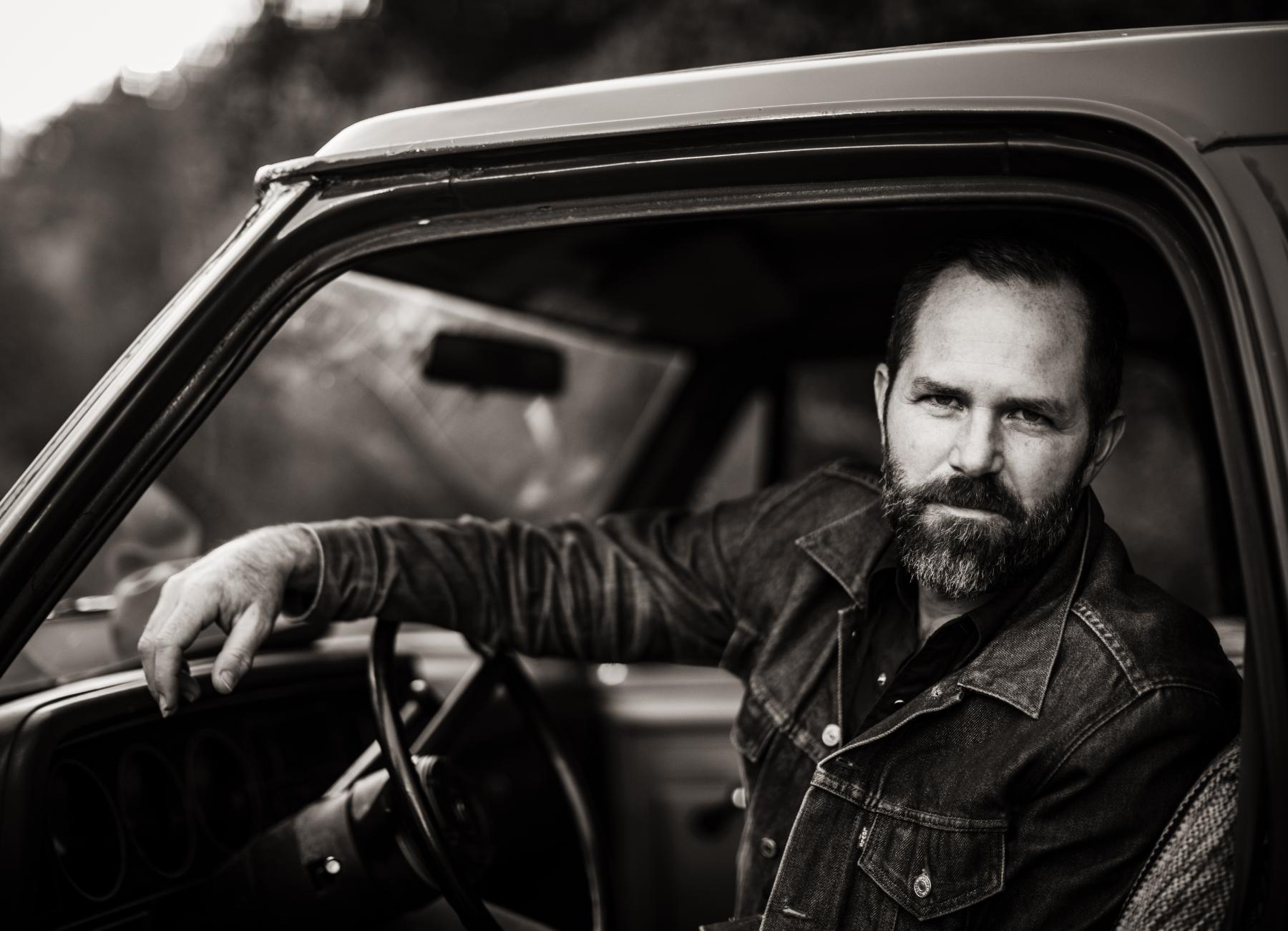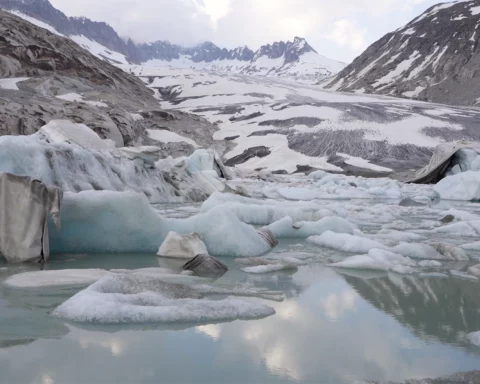Above: Jeffrey Foucault; photo by Joe Navas.
To call Jeffrey Foucault a songwriter’s songwriter is both fitting — he composes songs with a degree of artistry that upstarts emulate and veterans envy — and insufficient — one needs no background in that mystical pursuit to appreciate what he does. You just need to know a good thing when you hear it. Foucault delivers beautifully crafted songs in a dynamic synthesis of rock, folk and blues, with an assured style that he honed over decades on the road. He is a troubadour of the old school with a catalogue that reveals the very best that contemporary American music has to offer.
His latest collection, Deadstock: Jeffrey Foucault Uncollected Recordings 2005-2020, was assembled from favorite cuts that he couldn’t find space for on earlier records. He thinks of this collection as an album unto itself, rather than some kind of documentary, including seven new songs to complement the “unreleased tracks and alternate versions” that he unearthed from the archives. Every track reveals Foucault’s talents as a composer and performer and nudges his fans back toward earlier records to reimagine the original context for these recent releases.
Foucault will be performing locally on May 7 at The Barn in Egremont, Mass; May 8 at The Word Barn in Exeter, NH; and May 16 at Black Birch Vineyard in Hatfield, Mass. He and wife, Kris Delmhorst, will take the stage together at the Green River Festival in late August. We caught up with Foucault this week as he was gearing up for his return to the road.
Keep up with all of Jeffrey Foucault’s events and info at his website.
GG — You dabbled in live streaming during the COVID lockdown. What did you learn along the way? Do you anticipate ways in which live streaming might remain relevant to you once we are back to “normal”?
What I learned is that I can sit alone in a room with a cup of coffee and a stiff drink, and talk and play music into a phone turned sideways on a tripod for an hour and half, to a couple thousand people, and it more or less works. I didn’t know that was something I could do, and I didn’t frankly expect to enjoy it. It was a steep learning curve on the gear side – making sure it looks alright, and sounds good, and the broadcast is going out to the various platforms – and that’s still the hardest part, separating the engineering mind from the performing mind. There’s a reason we don’t run our own sound at live shows.
The other thing I learned is that even on the road a third of the year for twenty years and playing a lot of out of the way places, there are still many places I never get to. I can reach people around the world playing in my office in these strange times, and those people send along a little dough, and we get by. It’s been a humbling experience to be lifted up in such a personal way during the year off the road. I’m grateful, and I feel like I have a new relationship with the folks who really track my deal. I imagine we’ll play some of these livestream shows now and then going forward. The world won’t be running in greased grooves for a while yet, and I’m still trying to sort out what our touring life will look like.
GG — What’s on your mind, or in your daily practice, as you gear up for these May shows? Does this feel like a normal return to the road or something fundamentally different?
Getting ready to play is not as important as being ready to play. I learned by traveling with my friend Billy Conway, who plays drums with me, that genuine readiness is as much a spiritual and emotional proposition as a physical one. It pays to have your chops together, but you also have to be ready to become the person who gets up on stage and tries to deliver. That requires some self-knowledge and resolution. You need to know who you are, what you do, and why you do it. Then you’re ready for whatever.
GG — To what extent was music a collaborative endeavor in your household over the past year? In what ways did music hold the three of you together, and in what ways did it drive you apart?
Both Kris (Delmhorst, my wife) and I like to write in an empty house, so we’ve had to make some space for each other. I rented a basement room in an old knife factory by the falls in my little town most of last year, accessible only by a trap door, and I set up my guitars and recording gear in there. In terms of collaboration, we only really play together when we have a show to do. If I’m playing in the kitchen – or more likely, our twelve year old is playing in the kitchen – we might sing along while we’re making dinner, but that’s about as far as it goes. We like to play, but we are both playing and writing and working all the time toward certain things, and that’s mostly a solo adventure on the creative side.
GG — Your latest album, Deadstock, gathers together unreleased songs from the past 15 years. What prompted you to dig into the archives for that project? Do those songs sound different to you today?
Well, I had a lot of studio material sitting around, and I thought it was worthy. I always liked the songs, I just tend to be ruthless about cutting material off of records. I wasn’t on the road and I wasn’t going to be able to record with my band, but it seemed like a good time to retrench and create work that I could sell over the course of this year and the next, so Deadstock fell into that category, something to get out into the world to help us make a living, and of course, I had time.
Any time you dig into old recordings you remember things about the writing, the recording session, the life you were living as it all went down. That can be interesting. Coming to the material fresh after years, trying to piece the songs together so they fit against each other, was like building a stone wall. You have to turn things this way and that, maybe get a hammer out. Once songs are written and recorded, I don’t feel a lot of agency or responsibility for them. They exist on their own terms.
GG — Kris Delmhorst mentioned in an interview that you two can be tough editors for each other’s songwriting. Have you been sharing this past year? Do you ever co-write within your own household? Do you have other songwriters or musicians that you use as collaborative partners?
We have both written songs with our daughter, who is real prolific and not too precious about the process. She’s twelve and she knocks out a song every few days. It’s fun to write with her, because she has no habits of mind, and she’s like a magpie: she’ll make off with anything shiny, any good idea. Kris and I will show each other mostly finished songs and ask for edits, and that’s real useful. In terms of music, everything I do runs through Billy Conway, and we sort out the tunes I write, or that we write together, as we go along playing them night to night.
GG — I know that you are interested in William Deresiewicz’s The Death of the Artist. The past year has obviously been brutal for musicians. Can you think of any silver linings that musicians and music fans will begin to discover in the months & years to come?
I did an interview with Bill for Harpers Magazine, and I’m grateful there are people writing about the digital economy and art. I think the silver lining for most of us was being forced to sit still and look around, to pay attention to the quotidian, and live on a more human scale. It felt to me like the human race was riding the moving walkway at the airport, and then the walkway stopped. It was a hard year, but if human beings are going to make it through the century we’re going to have to spend the next two decades deeply engaged in changing the way we do things. The pandemic seems to have highlighted all the stress points in modern capitalism. Perhaps it makes a window to deal with them?
GG — How have you decided which gigs / venues / events to schedule for this spring / summer? What are you thinking about regarding set lists for your May gigs?
I’ll play outdoors some and then as the fall goes along we’ll look at the numbers and make a plan. It’s hard to imagine making a living if the clubs can’t work at capacity, and I don’t want to run all over hell and back burning jet fuel just to be out. We’ll take it slow and try to find a reasonable accommodation for all parties, a way of getting out to play that feels right.
As far as a set list, I haven’t thought much about it. We’ll get together and play a little, and then we’ll play again at sound check, and then I’ll write a set list of some songs we always play, and some we haven’t played, and some I forget about all the time, and then we’ll see what happens.

















